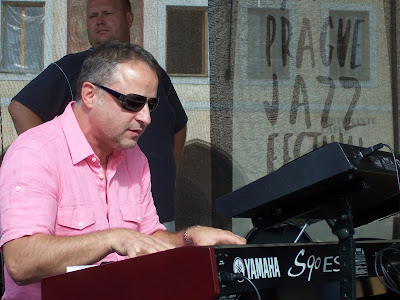The dates for AghaRTA's Autumn Festival concerts in the Lucerna Music Bar are out, and tickets should go online soon. Included in the programme are visits from global stars Candy Dulfer and John Scofield, Luboš Andršt's 60th birthday gig, Polish singer Anna Maria Jopek, and much much more.
Details and tickets at: http://www.agharta.cz/index.php?p=program&site=agharta_apjf
Sunday, August 31, 2008
News: Nika Diamant Interview on Radio Prague
It looks like there is another new Prague jazz album on the horizon, according to Nika in a recent interview. Hopefully there will be a feast of live performances in support of her new work!
The interview can be found at: http://www.radio.cz/en/article/107174
The interview can be found at: http://www.radio.cz/en/article/107174
Monday, August 25, 2008
Photos: Vladimír Mišík and ČDG
Czech music legend Vladimír Mišík was in action last week, as part of a free concert to commemorate the 40th anniversary of the Soviet invasion. Playing with him in his outfit were Prague Jazz's favourite violinist, Honza Hrubý, and Czech guitar supremo Radim Hladík (Modrý Efekt / Blue Effect). Sadly we can't bring you any of the free beer or free food that was there, but we can bring you some pictures:












News: New Beata Hlavenková CDs
Exciting news from Beata: She is currently finishing a CD with Lenka Dusilová and Clarinet Factory, under the name of Eternal Seekers. The album should be out at the end of September published by Respekt, and the release concerts are on the 21 and 22 of October during the Struny Podzimu festival: (http://www.strunypodzimu.cz/en/).
She is also planning to record a new CD in New York in January, featuring musicians including Ingrid Jensen, Jon Wikan, and Rich Perry. The album should eventually be released by Petr Ostrouchov's Animalmusic.
She is also planning to record a new CD in New York in January, featuring musicians including Ingrid Jensen, Jon Wikan, and Rich Perry. The album should eventually be released by Petr Ostrouchov's Animalmusic.
Monday, August 18, 2008
Gig Review: Beata Hlavenková Quartet
AghaRTA Jazz Centrum (“Young Women in Jazz” Concerts)
11th August 2008
Every so often an article appears in the press, or even worse on a website, announcing the death of jazz in Prague. The usual argument is that the creativity and innovation that once defined the city’s music is gone. No longer an act of political or artistic rebellion, and no longer a voice of a people gagged and bound in many other ways, the edge has been blunted. Nowadays, so the story goes, the jazz clubs of Prague offer a bland mush of bread-and-circus jazz-by-numbers for the passing punters. Take the cash, wiggle your ass, thank you very much, goodnight, and please do come again. This is arrant nonsense. While there may be some repertory acts doling out routine routines for the sort of people who wear baseball caps indoors and talk incessantly during the quiet bits, there are many outfits who are pushing the envelope and cooking up music with originality, innovation, and the excitement that has supposedly undergone extinction. For a prime example of this I humbly suggest that you look no further than the Beata Hlavenková Quartet.
Featuring Beata on piano, Rasťo Uhrík on acoustic bass, Dano Šoltis on drums, and Josef Štĕpánek on pedal steel guitar (no, this is not a country band), they are an outfit with a unique and uncompromising sound. Opening the evening with a blast of Thelonious Monk is not for the faint of heart, and the second piece, the original “Four Days”, went from subtle discord to a wide-screen wall of sound.
It did seem to take a couple of pieces for the outfit to settle down. Having the crew from Česká televize loitering around in order to make a live broadcast for their nightly arts slot maybe added an extra air of tension, but at 9:30 Beata did a quick interview for the watching nation and then launched the band into “Spring Story”. An original piece of epic proportions, it was also the point where they really hit their stride. A rolling ocean of different moods, ranging from fragile piano and vocal phrasing to some of the most aggressive ensemble playing I have seen in a long time, it epitomised just about everything good about live jazz. Attacking both the head and the heart it was a thrilling journey of tension and release, and from that moment onwards the Quartet would excel and shine for the rest of the night.
The inclusion of a pedal steel guitar is unusual in jazz, but here this unconventional instrument was put to good use. In places it was used to provide swirling washes of sound in the manner that a keyboard might be utilised, sometimes sweet and sometimes uneasily discordant. At other times Štĕpánek took the lead with rasping solos, sharply delivered and contrasting with Hlavenková’s more restrained piano forays. She is a selfless player, technically excellent but seemingly without the stage ego that many bandleaders enjoy flexing. There were some lovely solos, although it would have been fun to see her lose it totally just once and let rip with furious and violent abandon.
The award for the wildest playing of the night, however, must be awarded to Šoltis on drums. He seemed to be having a one-man party behind the skins, bashing away with uninterrupted joy and humour. Constantly working, both during ensemble playing and as a counterpoint to other soloists, he was clobbering skins, rims, metalwork, and even took an occasional swipe at a nearby chair.
The second and thirds sets were unrelentingly excellent. One of the most pleasing aspects of the Quartet’s music was the variety and complexity of structure in many of their pieces. Sometimes bands can fall into the trap of adopting the same format for every song: some ensemble playing, then the piano solo, then the bass solo, then sometimes the drum solo, then the big finish. There is nothing wrong with this, but it can get a bit predictable if the pattern is not broken. This was certainly not the case with the BHQ: their arrangements were twisting, winding journeys into the unknown. Sometimes an obvious ending was just the beginning of another, more complex section. Solos drifted in and out, taking the listener by surprise. It was interesting. It was thought-provoking. Most of all, it sounded good.
Even the idiotic chatter of some third set arrivistes, laughing and yakking like a communion of gibbons at one of the front tables, could not detract from the dark ethereal soundscapes and the moments of tenderness that this outfit was producing. These halfwits still needed a slap though. When will these inconsiderate apes realise that you go to a music club to listen to music? If you wanted to listen to them you would go to an arse club.
The evening ended with the majestic “Rainy Afternoon”, a more serious and thought-provoking piece than some of the romps that had gone before. No encores, and leave them wanting more. Beata’s outfit is one of the most interesting and different currently on the circuit, producing music that is challenging and demanding of thought, but still melodic and accessible. It is not music to be taken lightly, and like the best music the more you put into your listening the more you will get out of it. What it most certainly is not is two hours of jazz-by-numbers, and anyone who dares to think that the Prague jazz scene is dead needs to see them as soon as possible.
11th August 2008
Every so often an article appears in the press, or even worse on a website, announcing the death of jazz in Prague. The usual argument is that the creativity and innovation that once defined the city’s music is gone. No longer an act of political or artistic rebellion, and no longer a voice of a people gagged and bound in many other ways, the edge has been blunted. Nowadays, so the story goes, the jazz clubs of Prague offer a bland mush of bread-and-circus jazz-by-numbers for the passing punters. Take the cash, wiggle your ass, thank you very much, goodnight, and please do come again. This is arrant nonsense. While there may be some repertory acts doling out routine routines for the sort of people who wear baseball caps indoors and talk incessantly during the quiet bits, there are many outfits who are pushing the envelope and cooking up music with originality, innovation, and the excitement that has supposedly undergone extinction. For a prime example of this I humbly suggest that you look no further than the Beata Hlavenková Quartet.
Featuring Beata on piano, Rasťo Uhrík on acoustic bass, Dano Šoltis on drums, and Josef Štĕpánek on pedal steel guitar (no, this is not a country band), they are an outfit with a unique and uncompromising sound. Opening the evening with a blast of Thelonious Monk is not for the faint of heart, and the second piece, the original “Four Days”, went from subtle discord to a wide-screen wall of sound.
It did seem to take a couple of pieces for the outfit to settle down. Having the crew from Česká televize loitering around in order to make a live broadcast for their nightly arts slot maybe added an extra air of tension, but at 9:30 Beata did a quick interview for the watching nation and then launched the band into “Spring Story”. An original piece of epic proportions, it was also the point where they really hit their stride. A rolling ocean of different moods, ranging from fragile piano and vocal phrasing to some of the most aggressive ensemble playing I have seen in a long time, it epitomised just about everything good about live jazz. Attacking both the head and the heart it was a thrilling journey of tension and release, and from that moment onwards the Quartet would excel and shine for the rest of the night.
The inclusion of a pedal steel guitar is unusual in jazz, but here this unconventional instrument was put to good use. In places it was used to provide swirling washes of sound in the manner that a keyboard might be utilised, sometimes sweet and sometimes uneasily discordant. At other times Štĕpánek took the lead with rasping solos, sharply delivered and contrasting with Hlavenková’s more restrained piano forays. She is a selfless player, technically excellent but seemingly without the stage ego that many bandleaders enjoy flexing. There were some lovely solos, although it would have been fun to see her lose it totally just once and let rip with furious and violent abandon.
The award for the wildest playing of the night, however, must be awarded to Šoltis on drums. He seemed to be having a one-man party behind the skins, bashing away with uninterrupted joy and humour. Constantly working, both during ensemble playing and as a counterpoint to other soloists, he was clobbering skins, rims, metalwork, and even took an occasional swipe at a nearby chair.
The second and thirds sets were unrelentingly excellent. One of the most pleasing aspects of the Quartet’s music was the variety and complexity of structure in many of their pieces. Sometimes bands can fall into the trap of adopting the same format for every song: some ensemble playing, then the piano solo, then the bass solo, then sometimes the drum solo, then the big finish. There is nothing wrong with this, but it can get a bit predictable if the pattern is not broken. This was certainly not the case with the BHQ: their arrangements were twisting, winding journeys into the unknown. Sometimes an obvious ending was just the beginning of another, more complex section. Solos drifted in and out, taking the listener by surprise. It was interesting. It was thought-provoking. Most of all, it sounded good.
Even the idiotic chatter of some third set arrivistes, laughing and yakking like a communion of gibbons at one of the front tables, could not detract from the dark ethereal soundscapes and the moments of tenderness that this outfit was producing. These halfwits still needed a slap though. When will these inconsiderate apes realise that you go to a music club to listen to music? If you wanted to listen to them you would go to an arse club.
The evening ended with the majestic “Rainy Afternoon”, a more serious and thought-provoking piece than some of the romps that had gone before. No encores, and leave them wanting more. Beata’s outfit is one of the most interesting and different currently on the circuit, producing music that is challenging and demanding of thought, but still melodic and accessible. It is not music to be taken lightly, and like the best music the more you put into your listening the more you will get out of it. What it most certainly is not is two hours of jazz-by-numbers, and anyone who dares to think that the Prague jazz scene is dead needs to see them as soon as possible.
Wednesday, August 13, 2008
News: CD Alert!
It looks like there will be even more new CDs on the way, with both Matej Benko and Beata Hlavenková taking their outfits into the studio sometime soon. More news when we have it...
AghaRTA Open Air Concerts - Day 1
AghaRTA Open Air Concerts - Day 2
A fine opening set from the Luboš Andršt Group:




Rhythm Desperados:

A show-stealing set from Madfinger:



Woodwind master Jiří Stivín:

Saturday, August 2, 2008
GigTips: August 2008
The month of August is often hot and sunny, making it perfect for some outdoor music. Without a doubt the biggest event of the month in the capital is AghaRTA’s Prague Jazz Week, including two fantastic free concerts in Old Town Square. Featuring just about everyone you could wish to see, these are not to be missed.
Details and schedules can be found at: http://agharta.cz/index.php?p=program&site=agharta_apjf
If you fancy staying indoors then AghaRTA Jazz Centrum’s schedule includes the wonderful folk-jazzer Pavla Milcová (14/8) and the Paganini of the bass with his band, František Uhlíř Team (9/8).
Luboš Andršt will be turning the clock back to 1972 at Vagon (7/8) with a reformed version of one of his first bands, the fusion outfit Energit.
Finally, if you want something a bit more bouncy, then singer Leona Prokopcová will be giving her band a workout at AghaRTA Jazz Centrum (31/8). They mix jazz standards with upbeat and inventive pop-soul covers. If they don’t do Peter Gabriel’s “Don’t Give Up” then request it for an encore – it is worth it!
Remember to check the listings for changes, and reservations are advised. While you’re reserving do mention that you saw the gig recommended here!
Details and schedules can be found at: http://agharta.cz/index.php?p=program&site=agharta_apjf
If you fancy staying indoors then AghaRTA Jazz Centrum’s schedule includes the wonderful folk-jazzer Pavla Milcová (14/8) and the Paganini of the bass with his band, František Uhlíř Team (9/8).
Luboš Andršt will be turning the clock back to 1972 at Vagon (7/8) with a reformed version of one of his first bands, the fusion outfit Energit.
Finally, if you want something a bit more bouncy, then singer Leona Prokopcová will be giving her band a workout at AghaRTA Jazz Centrum (31/8). They mix jazz standards with upbeat and inventive pop-soul covers. If they don’t do Peter Gabriel’s “Don’t Give Up” then request it for an encore – it is worth it!
Remember to check the listings for changes, and reservations are advised. While you’re reserving do mention that you saw the gig recommended here!
Prague Jazz Book

If you prefer your Prague Jazz in coffee-table hardback style then it could be worth picking up “That Jazz of Praha”. Published by Vitalis, it features fourteen stalwarts of the local scene, including Karel Růžička, Robert Balzar, Najponk and Jiří Stivín.
The book has some excellent back and white photography, with both portraits and action shots. The only downside is that the text is in German, but then you don’t buy coffee-table books to read!
More details can be found at: http://www.vitalis-verlag.com/vitalis_cz/prag_cz.php (you have to scroll down).
The book has some excellent back and white photography, with both portraits and action shots. The only downside is that the text is in German, but then you don’t buy coffee-table books to read!
More details can be found at: http://www.vitalis-verlag.com/vitalis_cz/prag_cz.php (you have to scroll down).
I picked up my copy on sale at a bookshop in the Eden shopping centre for about 120 CZK: the bargains are out there!
Subscribe to:
Comments (Atom)





















